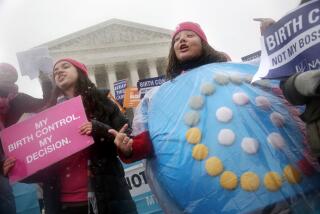Tragedies of Teen Pregnancies
Teen-age girls and boys who choose to become sexually active should have greater access to contraceptives, including birth-control pills and condoms at clinics on school grounds and wherever they congregate, to reduce teen-age pregnancies. That courageous recommendation by the prestigious National Research Council recognizes that early sex and early pregnancy are, lamentably, facts of life in the United States.
Nearly 1 million teen-agers get pregnant annually; a 15-year-old American girl is five times more likely to become pregnant than her counterpart in six other industrial nations. More than 400,000 American girls, a few not yet in their teens, become mothers every year; one out of five American babies is born to unwed parents. The statistics, though no longer startling, support the need for a strong, effective national policy to prevent teen-age pregnancies--tragedies that shackle dreams and siphon public budgets.
How would President Reagan, who opposes school-based clinics and any other availability of birth control for youngsters, reduce the nationâs exorbitant birthrate? Tell the kids to âjust say no.â He gives that same unrealistic advice to address the nationâs severe drug-abuse problem. If only it were that simple.
Sexually active teens--boys and girls--need the ability and the motivation to avoid pregnancy, according to Dr. Daniel D. Federman, a professor at Harvard Medical School who chaired the national panel of physicians, scientists, sociologists and health and behavioral scientists.
Teen-agers need sexual education that is direct and to the point, the report says. They need counseling, from abstinence to abortion. They need advice about adoption services that have been strengthened, and about support services if they decide to raise their babies.
Teen-age girls who choose to engage in sex need birth-control pills, which the panelâs report cited as the safest and most effective contraceptive for sexually active teen-agers, and they need information that will encourage diligent use. Young males need condoms, distributed where they congregate, and information that will cut through excuses.
The recommendation for condoms is significant because the national focus on teen-age sexuality and pregnancy often zeroes in on girls and lets boys off the hook. And the spreading AIDS epidemic makes the use of condoms the more urgent. The National Research Councilâs report--privately funded and aptly titled âRisking the Future . . .â--does not condone early sex or early pregnancy. It recognizes that it is in the best interest of the future of this nation to prevent the tragedies of teen-age pregnancies.
More to Read
Sign up for Essential California
The most important California stories and recommendations in your inbox every morning.
You may occasionally receive promotional content from the Los Angeles Times.










